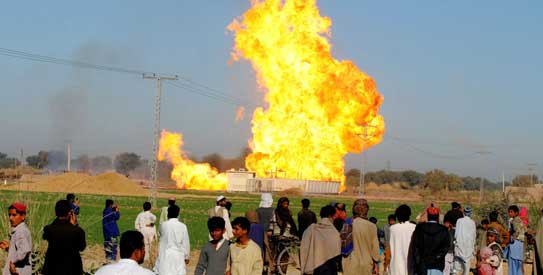QUETTA: Suspected tribal militants blew up two major natural gas pipelines in Pakistan's southwest on Tuesday, forcing the suspension of supplies to the strategic region bordering Afghanistan and Iran, officials said.
“We have suspended gas supply to the province as the pipelines are on fire,” Inayatullah Ismail, a spokesman for Sui Southern Gas Company (SSGC) that supplies gas to the southern parts of the country told Reuters.
Thinly-populated Baluchistan is home to Pakistan's largest gas supplies as well as one of the largest copper deposits in the world, with estimated ore reserves of 412 million tonnes.
Pakistan's third port, built with Chinese help, is at Gawadar in Balochistan.
Ismail said he was unsure how long it would take to extinguish the fire and resume gas supplies.
The twin explosions followed a late Monday night attack on four transmission pylons in the Bolan area, suspending power supplies to around half of the province's 30 districts.
A spokesman for the government-owned power company said that electricity to some parts of the provincial capital of Quetta had been restored, but the rest of the districts had been “in complete darkness for the last 24 hours”.
The separatist Baluch Liberation Army called media offices in Quetta, saying it had blown up the pylons and threatening to stage further attacks.
Baluch militants have been waging a low-level insurgency for decades but their campaign intensified after the assassination of a tribal elder, Nawab Akbar Bugti, in a military operation in 2006 during the tenure of military President Pervez Musharraf.
The activists target government installations, security forces, gas pipelines, railway tracks and electricity pylons as part of a drive to win more autonomy and control over the natural resources of Pakistan's biggest but poorest region.
The government of President Asif Ali Zardari, who replaced Musharraf, has tried to pacify Baluch nationalists by announcing huge development schemes for the region, but this has failed to stop separatist violence.
The militants and Baluch politicians complain of a lack of political representation and say their province's resources are exploited for other parts of Pakistan -- especially Punjab, the most populous and prosperous province.
Pakistani officials accuse old rival India of stirring up trouble in the region, allegations denied by New Delhi.
Militants linked to al Qaeda and Taliban are also active in Baluchistan, but officials say there is no evidence that they have links with Baluch separatists. – Reuters














































Dear visitor, the comments section is undergoing an overhaul and will return soon.